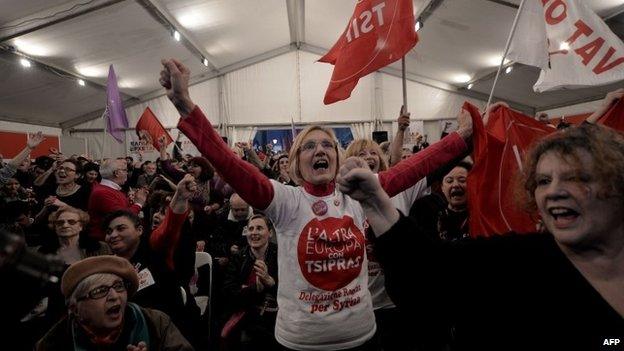Greek elections: Syriza's Tsipras faces great expectations
- Published

Alexis Tsipras's first act after being sworn in was to lay a wreath for communists murdered by the Nazis
As he climbed on an elevated stage in central Athens to give his victory speech on Sunday night, Alexis Tsipras looked more like a rock star than Greece's newly-elected prime minister.
"Our people too have a right to joy and celebration. For five years, they had taken both away from us," he told thousands of ecstatic supporters gathered to celebrate a historic victory for the left.
The magnitude of the challenges Mr Tsipras and his Syriza party face are daunting, however, and sustaining this enthusiasm inside Greece may prove even more difficult than convincing Europe to end austerity and forgive part of the nation's debt.
Exit poll analysis showed that Syriza not only triumphed among unemployed and working Greeks, but even penetrated the core of conservative voters, with one-in-three housewives and pensioners turning to the party.
Debt-cancellation promises
Syriza officials insist Alexis Tsipras is no Harry Potter-like magician and that the Greek people are realistic about what he can achieve.
And indeed, people in Athens say they do not expect Syriza to fulfil all their promises completely and immediately, as long as they carry out the policies that are most relevant to them.
The unemployed may not care too much about a hated property tax known as "Enfia", which Syriza has pledged to abolish, but they are expecting to find a job or, in the very least, have their benefits increased.
Take a look at the background of Greece's charismatic new leader
Talk to the propertied classes in Athens's leafy, rich, northern suburbs who voted for Syriza, and they will tell you that the promise of the abolition of the tax was one of the main reasons they voted for the left for the first time in their lives.
And all Greeks are expecting Syriza to deliver on their promise and demand debt-cancellation and growth policies from the EU.
Fulfilling those promises will take nothing short of Harry Potter-like powers, some analysts warn.
Mr Tsipras, the youngest political leader in modern Greek history, was instrumental in transforming Syriza from an also-ran to a potential ruling party.
His background is starkly different to that of his predecessors, all of them members of political dynasties.

Alexis Tsipras and the 700-euro generation

Alexis Tsipras celebrates victory with his wife, Peristera Baziana (R)
Alexis Tsipras was not schooled at the usual private schools that most politicians in Greece with a pedigree prefer, but graduated from a state school in Ampelokipoi, a middle-class area in central Athens.
It was at school that he met Peristera "Betty" Baziana, who was to become his wife. They were both active in the Communist Party of Greece's youth wing and shared the same world view.
Although they went to university in different cities, their relationship flourished. They chose a civil wedding instead of a traditional religious ceremony.
The couple now live in the middle-class Athens neighbourhood of Kypseli, and have two sons - Pavlos, 7, and 5-year-old Orpheas Ernesto (after Ernesto "Che" Guevara). Ms Baziana has rarely appeared in public and the couple have a very low-key social life, avoiding the paparazzi.
Mr Tsipras cut his professional teeth while working as a civil engineer and was one of the "700-euro generation", a term coined in 2007 to describe young people who struggled to advance beyond the average Greek salary.

Syriza campaigned under the slogan: "Hope is on its way"
In 2008, his political career took a significant step forward when he took on the leadership of Syriza, founded in 2004 as a coalition of groups and parties ranging from Maoists to Greens.
He was elected to parliament the following year and by 2011 had transformed the party from a marginal alliance into a major political force.
Known for his rhetorical skills, his dislike of neckties and his youthful looks, Mr Tsipras's colleagues see him as quite unlike any of Greece's traditional political grandees.
"He is just different. He is just like you and me," a member of Mr Tsipras's entourage at Syriza's headquarters told the BBC.

Pragmatism
"The economic crisis and the collapse of traditional parties certainly helped Syriza grow its influence, but it was Alexis Tsipras who catapulted the party," says Christoforos Vernardakis, professor of political science at Aristotle University of Thessaloniki and founder of the public opinion survey company VPRC.
"This happened because Tsipras is young and knows no fear. He took a defensive left and turned it into a credible choice for government."
Some of his first actions as Greek leader appear designed to show he aims to maintain a careful balance.
He was Greece's first prime minister to take a civil rather than a religious oath, and yet his first visit after he was elected was to the head of the Church of Greece.
Syriza leader Alexis Tsipras: "Today the people of Greece wrote history"
Although he told the German government he was not looking for a fight, his first act after being sworn in was to pay his respects to a monument honouring the communists executed by Nazi occupation forces in 1944.
He has also shown an unemotional pragmatism that may alienate ideological purists in his party but will prove valuable in his dealings with creditors.
Lacking an absolute majority in parliament, he chose to form a coalition with a right-wing populist party, the Independent Greeks.
Some Syriza voters and party members are already disillusioned by the choice. But others see it as proof of the coming of age of both Syriza and Mr Tsipras.

No ties allowed: Alexis Tsipras enters the prime minister's offices in Athens
His choice of finance minister is also telling.
Economics professor Yanis Varoufakis has been arguing for years in his classes and opinion pieces about the non-viability of austerity and the unsustainability of Greece's debt burden.
But he believes he can win the argument by reasoning with creditors.

Yanis Varoufakis (C) has long argued against the sustainability of austerity measures imposed on Greece
In an interview shortly before the election, he told the BBC that far from being destructive, Syriza's political proposals offered a reasonable way out of austerity and a chance to replace existing bailout laws with new ones.
"The first priority is renegotiating with creditors," he said.
"Syriza needs to speak the language of truth about the continuing triple bankruptcy of the country - public debt, banks, private sector - something no Greek government has done so far."
Then, he pointed out, the party had to put forward proposals that would be reasonable to the average German.
- Published26 January 2015

- Published14 May 2012

- Published26 January 2015
